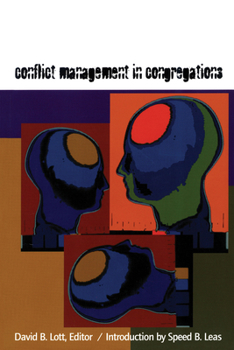Conflict Management in Congregations
Select Format
Select Condition 
Book Overview
Since its inception, the Alban Institute has earned a reputation as a leader in addressing congregational conflict management issues through its research, consulting services, educational events, and particularly its publications. Drawing on this rich heritage, the first title in our new "Harvesting the Learnings" anthology series gathers 20 classic Alban works on congregational conflict into a single, indispensable volume. Conflict Management in...
Format:Paperback
Language:English
ISBN:1566992435
ISBN13:9781566992435
Release Date:May 2001
Publisher:Rowman & Littlefield Publishers
Length:168 Pages
Weight:0.58 lbs.
Dimensions:0.4" x 6.0" x 9.0"
Customer Reviews
3 ratings
A Readers Review
Published by Thriftbooks.com User , 18 years ago
Conflict Management In Congregations is a helpful collection of writings that enables the reader to understand the basics of conflict management in congregations. The wisdom (among many things) gathered in this book instructs pastors and lay people to become better listeners, less anxious during conflict management, and more courageous in the face of possible conflict. Individuals who read this book are encouraged to face conflict and embrace the potential that can be born out of tumultuous circumstances. It is the disequilibrium in the church family system that often creates a level of discomfort that inhibits leaders in moving forward through conflict. However, the energy present in conflict has the potential to create something new and good in the life of a church. In fact, without well- managed conflict, the authors argue, new directions and vital ministries will not be created. Leaders who avoid conflict at all costs and opt for "happiness at any cost" will settle in to the comfortable and predictable ways that lead to coasting, lack of creativity, and the absence of future risk taking. The job of leaders is not so much to become enmeshed with every problem and conflict, but rather to hold and navigate the congregation toward the larger purpose and vision of their congregation. This book is a must read for those interested in doing the hard work of leading a church family through difficult circumstances.
A New Day for Conflict Management
Published by Thriftbooks.com User , 18 years ago
This collection of the experiences and wisdom of various writers is indeed a harvesting of learning. Together they assess the dynamics of conflict and provide productive ways in which to respond. Included are topics such as nine common sources of conflict in congregations, the illusion of congregational happiness (which would benefit any pastor or layperson who reads it), working through our defensiveness in the face of criticism, how to handle complaints about a fellow staff member, etc., just to name a few. All of these topics are interesting and insightful, and each writer has a new and fresh perspective. Conflict in the church can be most heartbreaking and much of the time is reduced to character assassination and blame. It is unrealistic to think that we will never become defensive when we are the recipients of such tactics. However, it is possible achieve a reasonable degree of personal growth which will help to deflect defensiveness and work toward resolution. To that end, it is beneficial to become as knowledgeable as possible and this book is a plausible resource.
A Good Tool for Conflict Management
Published by Thriftbooks.com User , 18 years ago
This book is a compilation of essays by various contributors in regard to the topic of conflict management within the local church. It is delineated into three main categories: A) The Dynamics of Conflict; B) Responding to Conflict; and C) Situational Conflict. It is one of the better texts I have read on conflict management. While it is not an exhaustive treatise on the subject, it is informative, practical, and relationship-honoring. It does not propose to cover every possible scenario in a parish that spawns conflicting mindsets or viewpoints. However, it does offer principles that can be applied to the many facets of conflict, wherever and whenever they may arise. Especially laudable is the editor's inclusion of Part Two of the text, Responding to Conflict. In this section, there are several thoughtful essays that, in essence, speak against the illusions of false happiness and "self-justification at all costs" techniques. One of the most common scenarios in the local church when conflict arises is an "us versus them" mentality. This section of material seeks to place relational harmony at a premium, over against the historical "win at all costs" position. The inclusion of Virstan Choy's essay in Chapter Sixteen is extremely helpful and outlines conflict resolution techniques that honor relationships over the conflict itself. Unfortunately, texts of this type are necessary because, as Roy Pneuman states in his essay, church people manage conflict poorly (51). Regardless of the reason behind that statement, I concur that it is an accurate one. All is not lost, though. With tools such as this text at their disposal, church leaders will be better able to "speak the truth in love," and understand that people - not opinions - are the church's greatest asset.






